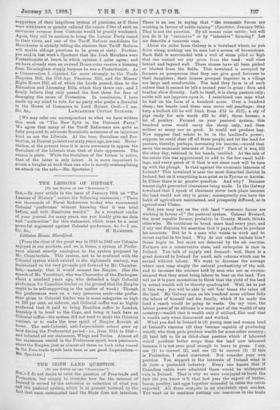THE LESSONS OF HISTORY.
[To TEX EDITOu ' Or TIM " SrNOTATOR.1 SIR,es-In your article in the issue of January 16th on "The Lessons of History" occurs the following statement : " There are thousands of Fiscal Reformers to-day who recommend Colonial ' preference' without knowing that it was tried before, and with disastrous results." As a constant reader of your journal for many years, can yon kindly give me data and " authorities " for this statement, which must be a most powerful argument against Colonial preference, &e. P—I am, [Prom the close of the great war in 1815 to 1845 our Colonies enjoyed in our markets, and we in theirs, a system of Prefer- ence almost exactly analogous to the system proposed by Mr. Chamberlain. This system, not to be confused with the Colonial system which existed in the eighteenth century, was Maintained on the very grounds put forward by Mr. Chamber. lain,—namely, that it would cement the Empire. (See the Speech of Mr. Vansittart, who was Chancellor of the Exchequer about a hundred years ago, who defended a high Colonial preference for Canadian timber on the ground that the Empire Ought to be self-supporting in the matter of wood.) Though the preferences were on a very generous scale—the prefer- ence given to Colonial timber was in some categories as high as 200 per cent. ad valorem, and Colonial coffee was so highly preferred that it paid to bring Brazilian coffee to London, tranship it in bond to the Cape, and bring it back here as Colonial coffee—the system did not tend to make the Colonies content, or to make the true spirit of Empire flourish at home. The anti-Colonial, anti-Imperialistic school grew up here during the Preferential period—i.e., from 1815 to 1845— and infected all our statesmen, Whigs and Tories. Almost all the statesmen reared in the Preference epoch were pessimists • aboutthe Empire, just as almost all these on both sides reared itt the Free-trade epoch have been or are good Imperialists.* ED. Spectator.]






































 Previous page
Previous page